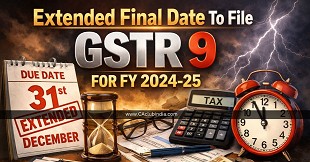GST Articles
Different types of GST Assessments
Rajagopal K 24 December 2025 at 06:50Assessment under GST explained with examples - self, provisional, scrutiny, best judgement and summary assessment under the CGST Act in a simple, practical manner.
Leasing of Residential Premises as Hostels: Supreme Court Settles the GST Exemption Debate
Bimal Jain 22 December 2025 at 10:39Supreme Court rules hostel accommodation qualifies as residential dwelling under GST, allowing exemption on rental income prior to July 2022 amendments.
Inspection, Search And Seizure Under GST: When The Law Learns To Let Go - Part III - The Concluding Part
Raj JaggiAn in-depth analysis of Section 67 of the CGST Act explaining provisional release, seizure limits, disposal of perishable goods, procedural safeguards, and how GST enforcement balances authority with fairness and due process.
Major GST Relief: Genuine Buyers Protected from Supplier GST Flaws
CS Lalit Rajput 22 December 2025 at 07:25Calcutta High Court rules that Input Tax Credit cannot be denied to genuine buyers solely due to retrospective GST registration cancellation of suppliers, reinforcing protection for bona fide taxpayers.
Whether Scrutiny Under GST In Terms Of Section 61 Of CGST Act Is Compulsory
Affluence Advisory 22 December 2025 at 06:41GST return scrutiny under Section 61 remains disputed. Read key High Court rulings on ASMT-10, taxpayer safeguards and direct SCN issuance.
When Observation Is Not Enough: Transition from Inspection to Search and Seizure (Part II)
Raj JaggiA detailed guide to GST search and seizure under Section 67(2), covering legal safeguards, procedural discipline, and key court rulings.
Consolidated FAQs on GSTR-9 and GSTR-9C for FY 2024-25
Shivani 18 December 2025 at 10:45GSTN releases consolidated FAQs on GSTR-9 & GSTR-9C for FY 2024-25, clarifying ITC reporting, auto-population, reversals, reclaims, late fees and new table changes.
Inspection under GST - When the Law Observes Before it Acts
Raj JaggiFrom fear to clarity, understand GST inspection, search and seizure under Section 67, its purpose, safeguards, procedures and how knowledge replaces anxiety.
Extended Final Date To File GSTR 9 For FY 2024-25
Ayush 16 December 2025 at 15:51Latest update on GSTR-9 filing deadline. Find out if the government has announced any extensions.
GST Audit Checklist
CA Amit Harkhani 16 December 2025 at 09:39Comprehensive GST self-audit checklist covering registration, outward and inward supplies, ITC eligibility, exports, RCM, job work, Rule 42/43 reversals, Rule 86B and payment compliance to reduce GST risks.
Popular Articles
- TDS Rate Chart For Tax Year 2026-27: With Revised Section Codes in Challans
- Revised Return Due Date Extension
- Tax Deduction Rules for Employee Contributions From April 2026
- Comprehensive Guide to Statutory, Tax & Regulatory Compliances for Hotels
- Section 144C Time-Limit Finally Clarified: No More Litigation on Draft vs Final Assessment Deadlines
- Foreign Assets Disclosure Gets A Fresh Window Under Finance Bill, 2026: Part I
- TDS and TCS: The New Shields and Arrows of the Taxpayer
- Finance Bill 2026 - Clause 72: Compassion In Compensation, Clarity In Compliance And Technology In Taxation
Trending Online Classes
-
DT & Audit (Exam Oriented Fastrack Batch) - For May 26 Exams and onwards Full English
 CA Bhanwar Borana & CA Shubham Keswani
CA Bhanwar Borana & CA Shubham Keswani -
IDT LIVE Exam Oriented Batch | May 2026, Sept 2026 & Jan 2027
 CA Arpita Tulsyan
CA Arpita Tulsyan














 CAclubindia
CAclubindia
